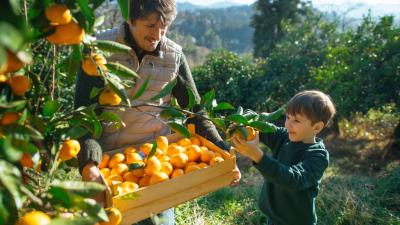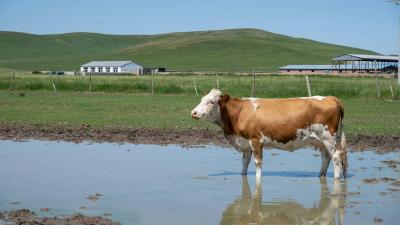‘Gov. Abbott: Tax Cow Burps’ Urge Texas Billboards Aimed at Fighting the Climate Crisis

Hereford, Texas—"Gov. Abbott: Tax Cow Burps,” urge new billboards that went up ahead of Earth Day in Hereford and Littlefield, Texas, near several cattle feedlots that emit among the highest amount of greenhouse gas emissions from cows in the United States. The Physicians Committee for Responsible Medicine, which is sponsoring the billboards, also wrote to Gov. Greg Abbott to ask him to use the tax revenue to support crops that can help fight the climate crisis and are also beneficial for human health.
“Several cattle feedlots in the Texas Panhandle emit among the highest amount of greenhouse gas emissions from the digestive process of cows in the United States,” wrote Anna Herby, DHSc, RD, CDCES, nutrition education program manager for the Physicians Committee for Responsible Medicine, in a letter dated April 11 to Gov. Abbott. “Phasing out meat industry operations is the best way to stem this crisis. But until that happens, I urge Texas to tax the state’s cattle feedlots and other meat-production-related facilities on their greenhouse gas emissions and use that money to support climate-friendly crops that can help offset climate change and are beneficial for human health—unlike red meat, which is linked to chronic disease.”
New Zealand recently proposed a tax on cow emissions, which they could reduce the amount of methane New Zealand’s livestock release into the atmosphere by as much as 47% by 2050.
Cattle produce methane as part of their normal digestive process, called enteric fermentation. When cows burp the methane is released into the atmosphere. Methane is also produced when animal manure is stored or managed in lagoons or holding tanks, according to the Environmental Protection Agency.
Experts say that cutting emissions from methane, which is relatively short-lived but has around 80 times more warming potential than carbon dioxide, is critical in preventing catastrophic climate change.
“Reducing livestock herds would also reduce emissions of methane, which is the second largest contributor to global warming after carbon dioxide,” according to the World Health Organization.
Texas is the No. 1 cattle producer in the United States, with more than 12 million cattle, according to the Texas Department of Agriculture. Research shows that beef contributes the most global greenhouse gas emissions from food production.
In Texas, climate change is causing warming temperatures, more intense rainstorms, more severe floods, and rising sea levels, according to the EPA. The agency says that in the coming decades, storms are likely to become more severe, deserts may expand, and summers are likely to become increasingly hot and dry, creating problems for agriculture and human health.
Swapping beef for beans could help the United States reach targeted greenhouse gas emission reductions, according to one study. Researchers compared simulated net emissions of legume production, subtracted those from average beef production rates, and used U.S. reduction goals for 2020 as a reference. Based on the results, legume substitution could account for 46-74% of the required reductions.
Black-eyed peas, kidney beans, and pinto beans are among the legumes grown in the High Plains of Texas, according to Texas A&M AgriLife Extension.
Trading beef for beans—and other plant foods—also benefits human health. Red meat, the end product of the feedlots, is linked to heart disease, diabetes, cancer, chronic kidney disease, and early death. Studies show that beans are beneficial for cardiovascular disease, type 2 diabetes, and weight management, and satisfy hunger more than meat.
Media Contact
Michael Keevican
202-527-7367
mkeevican[at]pcrm.org
Founded in 1985, the Physicians Committee for Responsible Medicine is a nonprofit organization that promotes preventive medicine, conducts clinical research, and encourages higher standards for ethics and effectiveness in education and research.








